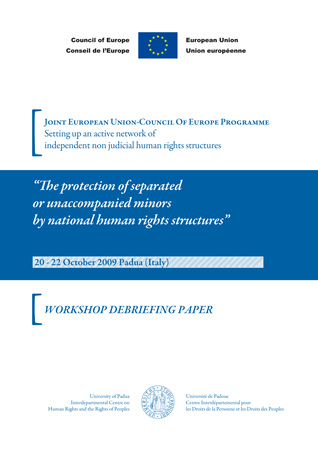Raccolte

The protection of separated or unaccompanied minors by national human rights structures
- Tipologia pubblicazione
- Altre pubblicazioni
- Città
- Padova
- Pagine
- 88
- Lingua
- EN
This publication summarises the findings of the workshop on “The protection of separated or unaccompanied minors by national human rights structures”, which was organised in Padua (Italy) on 20-22 October 2009 within the framework of the so-called “Peer-to-Peer Project”, a joint project between the Council of Europe and the European Union.
This project aims at setting up an active network of independent non-judicial human rights structures in Council of Europe member States.
The present publication was prepared by Stefano Valenti, of the Interdepartmental Centre on Human Rights and the Rights of Peoples of the University of Padua, on the basis of workshop’s notes taken by Orsolya Jeney.
This publication was funded the Council of Europe and the European Union. The content of this publication is the sole responsibility of the author and can in no way be taken to reflect the official opinion of the Council of Europe or the European Union.
Contents
Introduction
Chapter 1 - General context
A. Data and trends
B. Definitions
C. Legal framework
D. Major areas of concern
E. Long- term solutions+
Chapter 2 - The right not be detained and to be provided with a legal guardian
International standards
Practices in Europe: Italy - Monitoring the reception of unaccompanied minors arriving from the sea
Practices in Europe: the reception and protection at local level of UAMs victims of trafficking
Practices in Europe: management and training of guardians
Chapter 3 - The right to education and to health care
International and European standards
The national perspective: a participative project with separated children seeking asylum
Chapter 4 - The idea of a life project
Council of Europe standards
Practices in Europe: The Separated Children in Europe Programme
Conclusions
Appendixes
List of background documents
Workshop programme
List of participants
Introduction
The “Peer-to-Peer Project”, co-funded by the Council of Europe (CoE) and the European Union (EU), consists of a work programme run by the National Human Rights Structures Unit of the Council of Europe’s Directorate General of Human Rights and Legal Affairs and the Interdepartmental Centre on Human Rights and the Rights of Peoples of the University of Padua. It aims at setting up an active network of independent nonjudicial national human rights structures (NHRSs) compliant with the Paris Principles. Workshops for specialised staff members of the NHRSs are organised in order to convey selected information on the legal norms governing priority areas of NHRSs’ action and to proceed to a peer review of relevant practices used or envisaged in Europe.
The fifth and last thematic workshop organised in 2009 by the NHRS Unit under the Joint EU-CoE “Peer-to-Peer Project” for the attention of heads and staff of ombudsman offices and national human rights institutions, took place in Padua (Italy) and was attended by 43 persons, including participants, experts and organisers.
The discussions were structured around the issues most relevant to unaccompanied and separated minors (UAMs) and to the role of NHRSs to protect their rights. This included: The UAMs’ right not be detained • and to be provided with a legal guardian;
• The social rights of UAMs, especially the rights to education and to health care;
• The concept of a life project for UAMs and its limitations.
It was acknowledged that the timely provision of a proper guardianship is fundamental in order to ensure the protection of the above-mentioned rights. Guardianship is also pivotal for the concrete application of the best interests of the child and it is central to establishing appropriate action for resolving the situation for any UAM, including the balance of potentially conflicting rights. Best practices concerning the NHRS’ s involvement in the selection, training, use and monitoring of guardians were shared among participants.
Additional examples of initiatives by NHRSs for the protection of UAMs rights included investigation on individual complaints from children or those representing children; initiation of or support to legal action on behalf of children, including UAMs; publication and dissemination of information to raise awareness among professionals about the treatment of unaccompanied and separated minors; visits of reception centres and police detention centres; organisation of meetings and seminars with professionals of relevant national agencies, issuing special reports on the situation of UAMs in the respective countries addressed to the parliament and the government; provision of comments on immigration laws in order to ensure their compliance with international standards related to UAMs.
Among all the important and relevant contributions, it is to be mentioned the first-hand experience shared with participants by a former separated child.
She reported about her active participation in a project aimed at having a better understanding of the life and level of care afforded to separated or UAMs and facilitating the identification of key issues by separated children.
As a follow up to this event, it was decided to produce this workshop debriefing paper, which summarises the findings of the workshop and provides practical information to the NHRSs and references to documents concerning the role of national human rights structures in protecting UAMs. Each chapter lists points most relevant to the topics and discussions of the workshop, including summaries of experts’ contributions.

